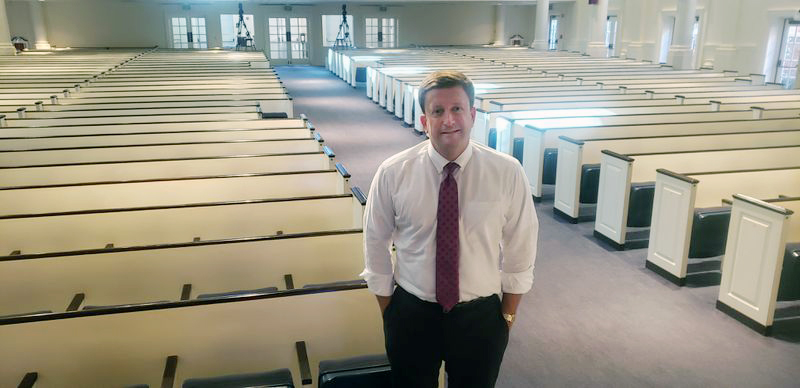
David Swanson, Senior Pastor of First Presbyterian Church in Orlando, Fla., has been preaching to an empty church during the coronavirus crisis. His sermons are live-streamed to the congregation. (photo credit: David Whitley)
On a normal Sunday morning, David Swanson will shake hundreds of hands. On an abnormal Thursday afternoon, there were only 20 hands in the building. No ushers, no bulletins, no offering plates, no choir, and no congregation. Swanson took the stage, and all he saw was 60 empty pews stretching to the back of sanctuary.
“Good morning, First Presbyterian Church of Orlando,” Swanson said to a camera.
For the next hour, the senior pastor played virtual preacher. When his recorded sermon was over, Swanson didn’t scurry to the foyer to greet a virtual line of members.
The non-virtual reality is that coronavirus has closed just about every church, so many are now streaming their services online. But technology giveth, and it taketh away. Computer glitches knocked last Sunday’s live service offline, so Swanson wasn’t taking any chances this week. He taped the service Thursday. It was just him, Senior Associate Pastor Case Thorp, a singer, an organist, two guitarists, a drummer, two video technicians, and a camera operator.
With all due glory to Silicon Valley, technology is not providing the miracle pastors, priests, rabbis, and imams an are looking for in this abnormal new world.
“I will tell you,” Swanson said, “this past week has been one of the most challenging ever.”
A minister is like an NFL coach. The public sees the team’s performance on Sundays, but most of the work is put in during the week.
It’s visiting hospitals, counseling members, leading meetings, directing outreach programs. At the core of it all is interacting with people. Swanson is more hard-wired for that than most.
“My goodness,” he said. “I don’t think I realized what a touchy-feely person I am.”
As a kid in Dallas, Swanson sat in Catholic mass and was mesmerized by the priest. He went to a Bible study at a Presbyterian church when he was 17.
“It was like a light came on,” Swanson said.
He had found his calling.
He’s been at First Presbyterian 15 years. The church celebrated its 144th anniversary Wednesday. Like many downtown churches, the flight to suburbia has been a challenge.
With about 4,000 members, First Presbyterian has tried to stay relevant by changing with the times. It’s safe to say none of the 11 original members who gathered at Prof. Benjamin Gould’s house on March 18, 1876, envisioned outreach programs powered by Facebook and Instagram.
But a virtual flock still needs a real shepherd, especially in a crisis. Swanson can’t go to Westminster Towers, the senior living facility, for his weekly lunch lecture.
He had to call four brides this week to inform them First Presbyterian can’t host their wedding ceremonies. Two decided to go ahead and be married in an empty church.
Swanson conducted a graveside funeral and couldn’t hug any mourners. He went to a hospital to visit sick members and was turned away.
“I thought they’d say, ‘Well, pastors can come in, but not average citizens,’” he said. “You’re caring for people. I think that makes us an indispensable part of health care, but we’re not. I understand that, but I do feel a little bit at loose ends.”
He’s in the hand-holding business, and hands are now off limits.
Swanson is trying to make up for that by starting daily online devotionals. He and his staff plan to call every church member.
“Do you need food? Do you need medicine,” they’ll ask. “Is there anything we can do?”
But there’s only so much a virtual ministry can do. Swanson acknowledged that in his Thursday/Sunday sermon.
“Trust me, I’m so grateful we can do this today,” he said. “But please, don’t get lulled into believing this is always going to sufficient, because it’s not. We’ve been created to be in relationships, face-to-face, in each other’s presence.”
So why has God taken that away?
Perhaps, to make us realize what we’ve lost in a world that now revolves around Facebook, Instagram, and socially isolating media.
“The incredible irony of this season is that God has removed from us the very thing we as a culture, as a nation, had started to take completely for granted,” Swanson said. “The privilege of being able to gather together for worship.”
When he finished speaking Thursday, the bright lights illuminating the pulpit shut down. The afternoon sun beamed through the stained-glass window, casting long shafts of light over the empty pews.
As the musicians quietly packed up their instruments, Swanson took off his coat, loosened his tie, and took a seat on the front row.
What he’d have given for just one hand to shake.
by David Whitley/Orlando Sentinel
Reprinted by permission

Re: **“Trust me, I’m so grateful we can do this today,” he said. “But please, don’t get lulled into believing this is always going to sufficient, because it’s not. We’ve been created to be in relationships, face-to-face, in each other’s presence.”**
This faithful pastor exhibited great wisdom in communicating this biblical truth to Christ’s flock. “I’m a Christian, but don’t need church” is a common but biblically indefensible belief among seemingly evangelical Christians today. While the current uncertainties related to this communicable disease require this electronic contingency, Dr. Swanson demonstrated godly wisdom in not allowing this method of “doing church” to become the norm for some, because it is certainly not the “norm” God intends!
May the Lord God Almighty continue to bless the work of his hands.